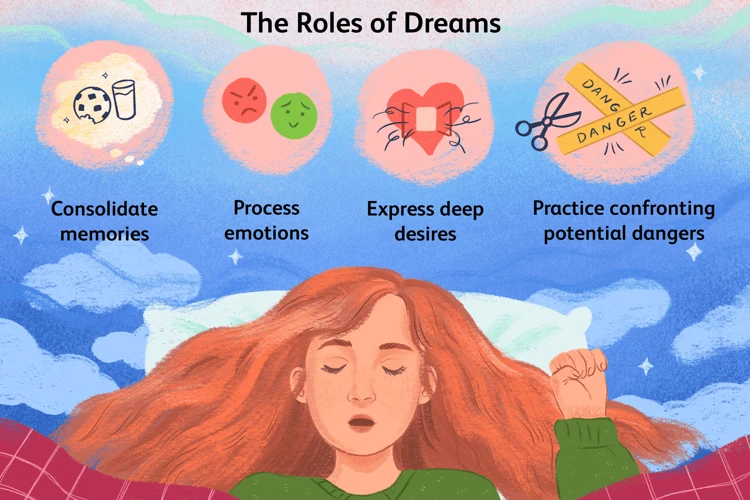Do you ever find yourself waking up from a dream, trying to make sense of the strange and vivid images that played out in your mind during the night? Dreams have long fascinated humans, with their mysterious and often symbolic content. But what about those dreams that seem to haunt us, recurring night after night? These recurring dreams can have a significant impact on our sleep quality and overall well-being. In this article, we will delve into the intriguing world of recurring dreams, exploring their meaning, their effects on our sleep patterns, emotions, and psyche. We will also discuss strategies for coping with these dreams and maintaining a healthy sleep routine. So, hold on tight as we journey into the enigmatic realm of dreams and their powerful influence on our lives.
The Significance of Dreams

Dreams are a fascinating and intricate part of our human experience. They hold a profound significance in our lives, offering a window into our subconscious mind. Understanding dreams helps us gain insights into our thoughts, fears, desires, and emotions that may be hidden from our waking consciousness. Dreams can serve as a means of processing daily experiences, consolidating memories, and problem-solving. They can also provide a platform for creative inspiration and self-reflection. Dreams have symbolic elements that carry hidden messages and meaning, often acting as a mirror to our innermost thoughts and concerns. The interpretation of dreams can be a valuable tool for personal growth and self-awareness. Exploring the significance of dreams opens up a world of possibilities, offering a deeper understanding of ourselves and the challenges we face.
1.1 Understanding Dreams
Understanding dreams is a complex and multifaceted endeavor that has intrigued humans for centuries. It involves unraveling the symbolism, messages, and patterns within our dreams to gain insights into our subconscious mind. Dreams are a reflection of our inner thoughts, emotions, and experiences, portraying images, sensations, and narratives that often defy logic and reality. They can be vivid or fleeting, pleasant or distressing, and may occur during different stages of sleep. While the exact purpose and meaning of dreams remain a topic of debate among psychologists and researchers, several theories aim to shed light on their significance. Sigmund Freud proposed that dreams serve as a gateway to our unconscious desires and repressed wishes, often manifesting through symbolism and disguised imagery. Carl Jung extended this perspective by emphasizing the collective unconscious, suggesting that dreams tap into archetypal symbols and universal themes. Another theory suggests that dreams play a role in memory consolidation, helping to integrate new information and experiences into our existing knowledge framework. Exploring and understanding dreams can provide valuable insights into our emotions, conflicts, and personal growth. By dissecting the elements of our dreams, we can gain a deeper understanding of ourselves and our subconscious mind. This understanding can pave the way for self-reflection, personal development, and even therapeutic exploration. For those experiencing recurring dreams, this understanding can be particularly beneficial in unraveling the underlying messages and themes that persistently resurface. The connection between recurring dreams and personal growth is a compelling area to explore further.
1.2 Types of Dreams
Dreams come in various forms and can encompass a wide range of experiences. Understanding the types of dreams that exist can provide insight into the nature and potential meanings of our dreams. One common type of dream is the *prophetic dream*, which is believed to offer glimpses into the future or provide guidance for important decisions. These dreams may seem vivid and realistic, leaving a lasting impression on the dreamer. Another type is the *lucid dream*, where the dreamer becomes aware that they are dreaming and can actively participate in and manipulate the dream’s course. Lucid dreams can be a thrilling and empowering experience, allowing the dreamer to explore their imagination and inner desires.
Recurring dreams, which are the focus of this article, are another important type. As the name suggests, recurring dreams repetitively occur over time, often with similar themes or patterns. These dreams tend to grab our attention due to their repetitive nature, and they can vary widely in content and emotion. Recurring dreams may serve as a message from our subconscious mind, highlighting unresolved issues or anxieties that need attention. By recognizing and analyzing the themes and symbols in these dreams, we can gain valuable insight into our own personal growth and development.
Finally, we have *nightmares*, which are distressing and often terrifying dreams accompanied by intense emotions such as fear, anxiety, or sadness. Nightmares can leave a lasting impact on our well-being, causing lingering stress and disrupting our sleep. These dreams may be triggered by traumatic experiences, unresolved trauma, or ongoing stress in our lives. It is important to address and process the emotions and fears associated with nightmares to promote better sleep quality and overall psychological well-being.
Understanding the different types of dreams helps us appreciate the vastness and complexity of our dream world. Each type offers unique experiences, meanings, and potential for personal growth. By exploring the intricacies of our dreams, we can unlock hidden messages, find connections to our waking life, and gain a deeper understanding of ourselves.
To learn more about the connection between recurring dreams and personal growth, click here.
The Concept of Recurring Dreams

Recurring dreams are a captivating aspect of the dream world that baffles and intrigues us. These dreams are characterized by their repetition, replaying the same or similar scenarios over and over again. They can be perplexing, leaving us questioning their meaning and purpose. Recurring dreams often arise from unresolved emotions, experiences, or concerns that linger in our subconscious mind. They may reflect deep-rooted fears, anxieties, or unmet desires. These dreams can have common themes or patterns, providing clues to their underlying messages. Exploring the concept of recurring dreams can shed light on our innermost thoughts and help us uncover hidden messages and symbolism within our psyche. If you’re seeking ways to break the cycle of recurring dreams, you can find helpful tips and strategies here. Additionally, understanding the symbolism in recurring dreams can offer valuable insights and self-reflection. Discover more about the hidden messages within recurring dreams here.
2.1 Definition of Recurring Dreams
Recurring dreams, as the name suggests, are dreams that occur repeatedly over a period of time. They are characterized by the persistence of similar themes, settings, or events that recur in different dream scenarios. These dreams often stand out from ordinary dreams due to their frequency and consistency. Recurring dreams can occur in various forms, ranging from a single dream that repeats itself identically each time to a broader theme that manifests in different variations. Whether it is recurring nightmares, dreams about a particular person or place, or a specific scenario, these dreams have a way of capturing our attention and leaving a lasting impression. The repetition of these dreams makes them stand out from other dreams and signifies their importance in our psyche. They may contain hidden messages or unresolved emotions that our subconscious mind is trying to communicate to our waking self. Understanding the definition of recurring dreams is the first step in unraveling their significance and exploring the impact they have on our sleep quality and overall well-being.
2.2 Common Themes and Patterns
Common themes and patterns in recurring dreams provide valuable insights into the underlying concerns and emotions that our subconscious mind is attempting to process. These themes often represent recurring scenarios or imagery that frequently appear in our dreams. While the specific themes can vary for each individual, there are some common patterns that have been identified by researchers and dream analysts.
1. Falling: One of the most common recurring dream themes is the sensation of falling. This dream often occurs when individuals are facing uncertainties or challenges in their waking life. The feeling of falling can symbolize a loss of control or a fear of failure, reflecting the individual’s anxieties and insecurities.
2. Being chased: Another frequently reported dream theme is being pursued or chased by an unknown entity or threat. This dream can indicate feelings of being overwhelmed or pursued by unresolved issues or conflict in one’s life. It may also represent a desire to escape or avoid certain situations.
3. Teeth falling out: Dreams about teeth falling out are prevalent and can be associated with feelings of vulnerability, powerlessness, or concerns about appearance and self-image. These dreams often occur during periods of significant life transitions, such as starting a new job or experiencing relationship changes.
4. Being unprepared for a test or presentation: Many individuals have recurring dreams related to being unprepared for an important test, presentation, or event. These dreams reflect feelings of inadequacy, fear of judgment, or concerns about performance and competence.
5. Being naked in public: Dreams of being naked in public are often linked to feelings of vulnerability, embarrassment, or a fear of being exposed or judged. These dreams can arise during times when an individual feels exposed or lacks confidence in their abilities.
It is important to remember that the interpretation of these themes and patterns may vary for each person, as they are deeply rooted in personal experiences and emotions. Exploring these recurring themes can aid in understanding the underlying psychological and emotional issues that may require attention or resolution.
The Impact on Sleep Quality

The occurrence of recurring dreams can have a significant impact on our sleep quality, leading to various disruptions and challenges. Firstly, it can lead to disrupted sleep patterns, where individuals may experience frequent awakenings throughout the night. These interruptions can prevent deep and restorative sleep, leaving individuals feeling fatigued and groggy during the day. Secondly, recurring dreams can increase sleep fragmentation, causing individuals to experience fragmented and incomplete sleep cycles. This can lead to feelings of unrest and a lack of refreshment upon waking up. Lastly, recurring dreams can contribute to insomnia and restlessness, making it difficult for individuals to fall asleep or stay asleep for a sufficient amount of time. The continuous recurrence of these dreams can lead to heightened anxiety and stress, further exacerbating sleep difficulties. The impact of recurring dreams on sleep quality is a complex and multifaceted issue that requires attention and investigation.
3.1 Disrupted Sleep Patterns
Disrupted sleep patterns are one of the major consequences of recurring dreams. These dreams can cause frequent awakenings throughout the night, leading to fragmented and disturbed sleep. Individuals may find themselves waking up multiple times, feeling restless and unable to maintain a continuous sleep cycle. This disruption can prevent the individual from entering deep, restorative stages of sleep, such as REM (Rapid Eye Movement) sleep. As a result, they may experience daytime sleepiness, fatigue, and a general lack of energy.
During recurring dreams, the mind becomes highly active, engaging in intense emotional processing and cognitive activity. This heightened brain activity can interfere with the natural progression of sleep stages, leading to interruptions in both REM and non-REM sleep. The disrupted sleep patterns can result in a decrease in the overall quality of sleep, leaving individuals feeling unrested and unrefreshed upon waking.
In addition to the physical impact, disrupted sleep patterns can also have negative effects on mental and emotional well-being. Poor sleep quality associated with recurring dreams can contribute to emotional instability, irritability, and difficulty in regulating emotions. It may also lead to difficulties in concentration, memory, and cognitive functioning throughout the day.
It is important to address and manage disrupted sleep patterns caused by recurring dreams, as chronic sleep disturbances can have long-term consequences on overall health and well-being.
3.2 Increased Sleep Fragmentation
Increased sleep fragmentation is another significant impact of recurring dreams on sleep quality. When we experience recurring dreams, our sleep is often disrupted throughout the night, leading to fragmented sleep patterns. This means that we may wake up multiple times during the night, interrupting the natural progression of sleep stages. Each time we awaken, it becomes challenging to fall back asleep, as the mind is still preoccupied with the content of the dream. As a result, the overall duration and quality of our sleep are compromised. This disruptive cycle of frequent awakenings can leave us feeling exhausted and fatigued during the day. It may also contribute to difficulties in maintaining a consistent sleep schedule, as our sleep-wake cycle becomes disrupted. This can further exacerbate the negative effects on our overall well-being. Finding ways to address and manage these sleep disruptions is crucial for improving sleep quality and minimizing the negative consequences of increased sleep fragmentation.
3.3 Insomnia and Restlessness
Insomnia and restlessness are common consequences of recurring dreams. When recurring dreams disrupt sleep, it can lead to difficulties falling asleep or staying asleep throughout the night. The vivid and often unsettling nature of these dreams can create a sense of fear or anxiety, making it challenging to relax and enter a restful state. As a result, individuals may experience restlessness, tossing and turning in bed, unable to find comfort or peace. The persistent presence of these dreams can create a cycle of sleep deprivation, as individuals become apprehensive about going to bed, fearing the recurrence of disturbing dreams. This can further exacerbate insomnia and restlessness, creating a vicious cycle that impacts overall sleep quality and well-being. It is important to address the root causes of recurring dreams and find strategies to break this cycle to promote restful and rejuvenating sleep.
The Emotional and Psychological Effects

Recurring dreams can have a profound impact on our emotional and psychological well-being. The persistence of these dreams can lead to heightened levels of anxiety and stress, as the same troubling scenarios play out repeatedly in our subconscious minds. This constant exposure to distressing dream content can have a direct influence on our mood, leaving us feeling overwhelmed, unsettled, or even depressed during our waking hours. Additionally, the emotional weight of recurring dreams can permeate into our daily lives, affecting our relationships, work performance, and overall quality of life. It is important to recognize and address these emotional and psychological effects in order to promote a healthy and balanced mindset. Seeking support from a mental health professional or engaging in personal reflection and analysis can help navigate the underlying emotions and themes present in recurring dreams, leading to a greater sense of emotional well-being and resilience.
4.1 Heightened Anxiety and Stress
Heightened anxiety and stress are common emotional responses associated with recurring dreams. When we experience the same distressing scenarios or themes in our dreams repeatedly, it can trigger a sense of unease and apprehension even after waking up. These dreams can leave a lingering impact on our mental well-being, causing heightened levels of anxiety and stress throughout the day. The vivid and realistic nature of recurring dreams can make it challenging to separate the dream world from reality, leading to a constant state of worry and uneasiness. The emotional intensity of these dreams can also exacerbate existing anxiety disorders or contribute to the development of new ones. The continuous cycle of experiencing distressing dreams and the accompanying emotional turmoil can negatively impact overall quality of life and well-being. Coping mechanisms such as stress reduction techniques, therapy, and self-care strategies are essential in managing the heightened anxiety and stress that accompany recurring dreams. By addressing and managing these emotions, individuals can work towards creating a calmer and more peaceful state of mind, even in the face of recurring dreams.
4.2 Impact on Mood and Emotional Well-being
Recurring dreams can have a profound impact on our mood and emotional well-being. These dreams, with their repetitive and often unsettling content, can lead to a range of emotional responses such as fear, anxiety, sadness, or even anger. The constant recurrence of the same dream theme can leave individuals feeling overwhelmed and emotionally drained. When these dreams disrupt our sleep and invade our waking thoughts, they can create a sense of unease and unrest that lingers throughout the day. The emotional weight carried by recurring dreams can lead to heightened stress levels and a decrease in overall emotional well-being. It is not uncommon for individuals experiencing these dreams to feel a persistent sense of unease or a lingering sadness, which can lead to a decline in their overall mood and outlook on life. The disruptive nature of recurring dreams can interfere with daily functioning and impact interpersonal relationships as well. It is essential to recognize the emotional toll that recurring dreams can have and to explore effective coping strategies to address and manage the resulting emotional impact. By taking steps to address the emotional effects of recurring dreams, individuals can work towards restoring a sense of emotional well-being and finding peace in their dream experiences.
The Relationship with Overall Well-being

Recurring dreams not only impact our sleep quality but also have a profound effect on our overall well-being. The relationship between recurring dreams and well-being can be understood through their influence on cognitive functioning and physical health. When we experience recurring dreams, especially those with negative or distressing themes, it can lead to heightened anxiety and stress levels. This constant mental and emotional turmoil can disrupt our cognitive abilities, making it difficult to focus, concentrate, and perform daily tasks efficiently. Additionally, the emotional toll of recurring dreams can impact our mood and emotional well-being, leading to feelings of sadness, frustration, and even depression. The constant presence of these dreams can also affect our physical health, manifesting as fatigue, headaches, and even compromised immune function. It is crucial to address the impact of recurring dreams on our overall well-being and implement coping strategies to restore balance and promote a healthier state of mind and body.
5.1 Effect on Cognitive Functioning
The impact of recurring dreams on cognitive functioning cannot be overlooked. These persistent dreams can disrupt normal cognitive processes and interfere with our ability to concentrate, focus, and make decisions. The vivid and often unsettling nature of recurring dreams can leave us feeling mentally drained and fatigued upon waking up. This mental exhaustion can lead to difficulties in problem-solving, memory recall, and critical thinking. Additionally, recurring dreams may increase cognitive rumination, causing repetitive and intrusive thoughts that preoccupy our minds throughout the day. This constant mental loop can impede our ability to engage in productive and efficient cognitive tasks. Research has shown that individuals experiencing frequent recurring dreams may exhibit a decrease in cognitive performance, leading to decreased productivity and impaired cognitive functioning in both personal and professional domains. Such cognitive impairments can also affect our overall sense of well-being, as cognition plays a vital role in our daily functioning and ability to navigate the world around us.
5.2 Implications for Physical Health
Recurring dreams not only impact our sleep quality and emotional well-being but can also have implications for our physical health. When we experience these dreams on a regular basis, it can lead to physical effects that manifest in our bodies. The disrupted sleep patterns associated with recurring dreams can result in sleep deprivation, which can weaken our immune system and leave us more susceptible to illness and infections. Chronic sleep disturbance can also contribute to fatigue and a weakened ability to concentrate, affecting our overall physical performance and productivity. Additionally, the increased stress and anxiety caused by these dreams can lead to elevated levels of cortisol, the stress hormone, in our bodies. Prolonged exposure to high levels of cortisol can have detrimental effects on our physical health, including cardiovascular problems, weight gain, and compromised immune function. Addressing and managing recurring dreams becomes essential not just for our mental well-being but also for maintaining optimal physical health. Finding strategies to promote restful sleep and reduce stress can help alleviate the physical implications of recurring dreams, fostering a healthier and more balanced lifestyle.
Interpreting Recurring Dreams

Interpreting recurring dreams requires a combination of analysis and self-reflection. When faced with recurring dreams, it can be helpful to seek professional guidance from dream experts, therapists, or psychologists who specialize in dream analysis. These professionals can provide valuable insights and help decipher the hidden meanings behind the recurring themes and symbols in our dreams. Additionally, personal reflection and analysis play a crucial role in understanding recurring dreams. Keeping a dream journal and documenting the details of each dream can aid in recognizing patterns and identifying recurring motifs. Reflecting on the emotions and experiences associated with these dreams can offer valuable clues about their potential significance. By combining external expertise and personal reflection, we can deepen our understanding of recurring dreams and gain valuable insights into our subconscious mind.
6.1 Seeking Professional Guidance
Seeking professional guidance can be a helpful approach when it comes to interpreting and understanding recurring dreams. Consulting with a therapist or a dream analyst who specializes in dream analysis can provide valuable insights and perspectives on the underlying meanings of these dreams. These professionals have the expertise and knowledge to help unravel the symbolism and hidden messages within recurring dreams. They can guide individuals in exploring their subconscious mind and uncovering unresolved emotions, fears, or conflicts that may be manifesting in their dreams. Through various therapeutic techniques, such as dream analysis, psychotherapy, or cognitive behavioral therapy, professionals can assist individuals in unraveling the complexities of their recurring dreams and finding connections to their waking life. Professional guidance can offer a safe and supportive space for individuals to explore their dreams with an objective perspective, ultimately leading to personal growth, self-awareness, and a deeper understanding of oneself.
6.2 Personal Reflection and Analysis
Personal reflection and analysis is a powerful tool for decoding the meaning behind recurring dreams. By taking the time to reflect on the content, emotions, and symbols present in these dreams, individuals can gain valuable insights into their own subconscious mind. One effective approach is to keep a dream journal, documenting the recurring dreams in detail. This practice helps in identifying patterns, themes, and recurring symbols that may hold significant meanings. Additionally, it is important to examine the emotions experienced during these dreams as they can provide clues about unresolved issues or concerns in waking life. Engaging in self-analysis and introspection can assist in unraveling the underlying messages and implications of these dreams. It can be helpful to ask questions such as: What emotions am I experiencing during the dream? Are there any situations or events in my waking life that may be connected to the dream? Exploring these questions can lead to a deeper understanding of oneself and the potential sources of stress or conflict that may be manifesting in the form of recurring dreams. Through personal reflection and analysis, individuals can gain a better understanding of their inner thoughts, emotions, and experiences, ultimately aiding in personal growth and self-discovery.
Coping Strategies and Solutions
When faced with recurring dreams that disrupt our sleep and impact our overall well-being, it’s crucial to develop effective coping strategies. One approach is to establish a consistent sleep routine, ensuring that we create a peaceful sleep environment and prioritize restful sleep. This includes maintaining a regular sleep schedule, avoiding stimulating activities before bedtime, and practicing relaxation techniques such as deep breathing or meditation. Additionally, incorporating stress-reduction techniques into our daily lives can help alleviate the emotional burden associated with recurring dreams. Engaging in activities such as exercise, yoga, or journaling can provide an outlet for expressing emotions and reducing anxiety. Another helpful strategy is exploring dream journaling, where we keep a record of our dreams and reflect on their possible meanings or patterns. This process allows for greater self-awareness and can aid in identifying underlying issues that may be contributing to recurring dreams. By implementing these coping strategies and solutions, we can take proactive steps towards improving our sleep quality and overall well-being.
7.1 Establishing a Consistent Sleep Routine
Establishing a consistent sleep routine is crucial for improving sleep quality and managing recurring dreams. By setting regular bedtimes and wake-up times, our bodies can develop a natural sleep-wake cycle, known as the circadian rhythm. This consistency helps regulate our internal body clock and promotes more restful sleep. Creating a relaxing bedtime routine can signal to the body that it’s time to unwind and prepare for sleep. This can include activities such as reading a book, taking a warm bath, or practicing relaxation techniques like deep breathing or meditation. It’s also important to create a sleep-friendly environment by keeping the bedroom cool, dark, and quiet. Avoiding electronic screens, exercising regularly, and limiting caffeine intake can further support a consistent sleep routine. Implementing these habits can help improve sleep quality, minimize disruptions during the night, and reduce the frequency of recurring dreams.
7.2 Incorporating Stress-Reduction Techniques
Incorporating stress-reduction techniques into your daily routine can be highly beneficial in managing the impact of recurring dreams on your sleep quality and overall well-being. Stress plays a significant role in both the frequency and intensity of recurring dreams, so finding effective ways to reduce stress is essential. One powerful technique is practicing relaxation exercises such as deep breathing, meditation, or mindfulness. These techniques help calm the mind, release tension, and promote a sense of inner peace. Additionally, engaging in regular physical exercise can help alleviate stress by releasing endorphins, the body’s natural mood-boosting chemicals. Engaging in activities such as yoga, tai chi, or aerobic exercises can help reduce anxiety, improve sleep, and enhance overall well-being. Another effective stress-reduction technique is seeking support from others. Talking to a trusted friend, family member, or therapist about your recurring dreams and the stress they cause can offer valuable insight, comfort, and guidance. They can provide an outside perspective and offer coping strategies tailored to your specific needs. It is crucial to make self-care a priority by engaging in activities you enjoy and that promote relaxation, such as taking a warm bath, listening to soothing music, or engaging in a creative hobby. By incorporating stress-reduction techniques into your daily routine, you can effectively manage the impact of recurring dreams on your sleep quality and overall well-being.
7.3 Exploring Dream Journaling
Exploring Dream Journaling can be an effective and therapeutic way to understand and analyze recurring dreams. By keeping a dedicated journal to record details of your dreams immediately upon waking, you can capture vivid imagery, emotions, and other important aspects of your dream experiences. Creating a dream journal allows you to revisit your dreams later on, helping you identify patterns, symbols, and themes that may be present in your recurring dreams. When journaling, it is essential to write down as much detail as possible, including specific objects, people, locations, and any notable sensations or feelings experienced in the dream. By gathering this information, you can start to decipher the underlying message or meaning behind your recurring dreams. Additionally, you may notice connections between your dreams and events or situations in your waking life. Dream journaling can also serve as a tool for catharsis, as it allows you to express and process any emotions or anxieties that may arise from your dreams. Whether you choose to keep a physical notebook or use a digital platform to record your dreams, the act of journaling can promote self-reflection and self-awareness. By exploring your dreams on a deeper level, you may uncover valuable insights and gain a better understanding of yourself and your subconscious mind.
Conclusion
In conclusion, recurring dreams have a significant impact on sleep quality and overall well-being. These dreams can disrupt sleep patterns, causing increased sleep fragmentation and potentially leading to insomnia and restlessness. The emotional and psychological effects of recurring dreams are also notable, as they can heighten anxiety and stress, negatively impact mood and emotional well-being, and even affect cognitive functioning. Moreover, the implications for physical health cannot be overlooked, as chronic sleep disturbances can lead to a range of health issues. Interpreting recurring dreams can provide valuable insights, and seeking professional guidance or engaging in personal reflection and analysis can help unravel their meaning. Coping strategies such as establishing a consistent sleep routine, incorporating stress reduction techniques, and exploring dream journaling can be helpful in managing recurring dreams and improving overall sleep quality. Ultimately, by understanding and addressing the impact of recurring dreams, individuals can work towards achieving better sleep and enhancing their overall well-being.
Frequently Asked Questions
What causes recurring dreams?
The exact cause of recurring dreams is not yet fully understood. However, they are believed to be associated with unresolved emotions, anxieties, traumas, or patterns of thinking that persist in the subconscious mind.
Are recurring dreams the same as nightmares?
Not all recurring dreams are nightmares, although nightmares can be a type of recurring dream. Recurring dreams can encompass a range of experiences, including pleasant, neutral, or disturbing themes.
Can recurring dreams be a sign of an underlying health issue?
Recurring dreams are often reflective of our psychological and emotional well-being rather than an indicator of a specific health issue. However, chronic sleep disturbances caused by recurring dreams can have an impact on our overall health.
Do recurring dreams have a specific meaning or interpretation?
The meaning of recurring dreams can vary greatly from person to person. They are highly personal and often tied to individual experiences and emotions. Seeking the guidance of a dream analyst or therapist can help with interpreting their unique symbolism.
Can recurring dreams be stopped?
While there is no guaranteed way to stop recurring dreams, there are strategies that can help reduce their frequency or intensity. These include establishing a consistent sleep routine, managing stress levels, and exploring techniques such as dream journaling.
Are recurring dreams more likely to occur during a specific stage of sleep?
Recurring dreams can occur during any stage of sleep, including both rapid eye movement (REM) and non-rapid eye movement (NREM) sleep. However, they are more likely to be vivid and memorable when they occur during REM sleep, which is associated with dreaming.
Can recurring dreams have a positive impact on personal growth?
Yes, recurring dreams can provide valuable insights into our subconscious mind and help us identify unresolved issues or patterns in our lives. By exploring the symbolism and messages within these dreams, we can gain a deeper understanding of ourselves and promote personal growth.
Is it necessary to seek professional help for recurring dreams?
Seeking professional help, such as consulting with a therapist or dream analyst, can be beneficial for individuals who are deeply troubled by their recurring dreams or wish to gain a deeper understanding of their meanings. However, not all recurring dreams require professional intervention.
Can recurring dreams have an impact on daily life?
Yes, recurring dreams can have a significant impact on daily life. They can cause sleep disturbances, leading to reduced sleep quality and daytime fatigue. Recurring dreams can also affect emotions, mood, and overall well-being, potentially influencing decision-making and daily interactions.
Do recurring dreams always have the same plot or theme?
Recurring dreams may not always have identical plots or themes, but they often contain similar elements or patterns that repeat over time. These recurring elements can be symbolic and hold valuable insights into our subconscious thoughts and emotions.








